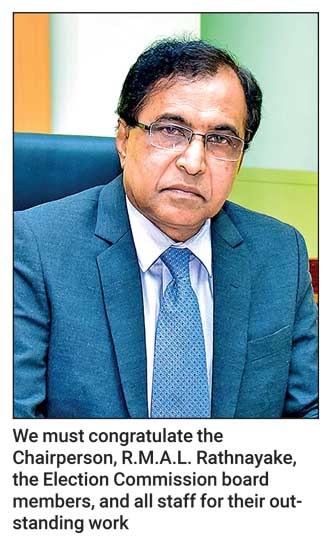Saturday Feb 21, 2026
Saturday Feb 21, 2026
Tuesday, 1 October 2024 00:02 - - {{hitsCtrl.values.hits}}
 A peaceful, fair, and corruption-free national election is a rare achievement for a developing, financially struggling country. However, we should take pride in our Election Commission, which excelled in planning, executing, counting, and releasing the results of a significant and complex election in a remarkably short time. Additionally, the Commission effectively mitigated post-election celebrations, preventing the violence and intimidation that often follow.
A peaceful, fair, and corruption-free national election is a rare achievement for a developing, financially struggling country. However, we should take pride in our Election Commission, which excelled in planning, executing, counting, and releasing the results of a significant and complex election in a remarkably short time. Additionally, the Commission effectively mitigated post-election celebrations, preventing the violence and intimidation that often follow.
First, we must congratulate the Chairperson, R.M.A.L. Rathnayake, the Election Commission board members, and all staff for their outstanding work. Such recognition is seldom seen, even in the media, which tends to focus more on inflammatory stories that threaten peace.
While our Election Commissions have not always been immune to political influence, including occasional improprieties, the impact of such influences was notably weaker this time. This is largely due to the exceptional professionalism of everyone involved, including the judiciary, which played a pivotal role in upholding the integrity of the election process.
This election serves as a prime example of what can be achieved when an independent, professional organisation operates without political interference. Many aspects of governance should be managed by professionally selected boards, free from political appointees and parachuted secretaries, who might otherwise undermine the independence, integrity, and effectiveness of such bodies. Several independent commissions should operate under this model. These include:
1. Planning and Monitoring Commission
2. Judicial Services and Arbitration Commission
3. Public Services Commission
4. Elections Commission
5. Audit Commission
 6. Bribery, Anti-Corruption, and Serious Fraud Commission
6. Bribery, Anti-Corruption, and Serious Fraud Commission
7. Education and University Regulatory Commission
8. Multicultural, National Heritage, and Unity Commission
9. Human Rights and Access to Information Commission
10. Science, Technology, and Medical Research Commission
11. Economic, Social, and Foreign Investment Development Commission
12. Standards, Productivity, and Innovation Commission
13. Agriculture and Exports Development Commission
14. Lands, Irrigation, Environment, and Climate Action Commission
15. Procurement and Public Utilities Commission
16. Corporate Governance Regulatory (Antitrust Laws) Commission
17. Cooperative Enterprise Development Commission
18. Parliamentary Standards and Training Commission
19. Public Finance Commission
20. National Quality Assurance Commission for Public Services of the Government
I trust that the new President will recognise the importance of these commissions and take the necessary steps to ensure they can function independently, uphold their quality assurance processes, and remain free from political interference. This is the path to both peace and development for our nation.
(The writer can be reached via [email protected].)